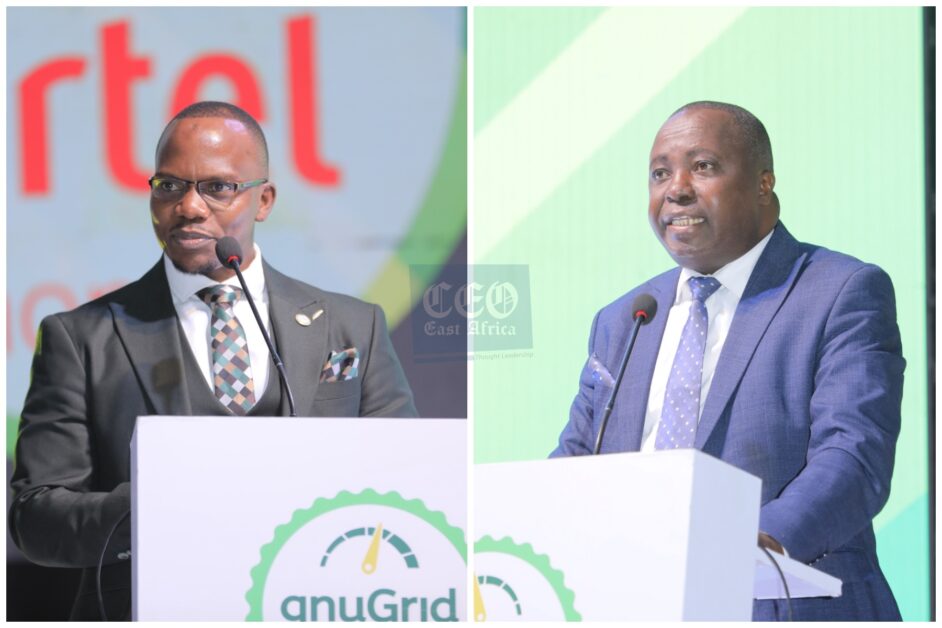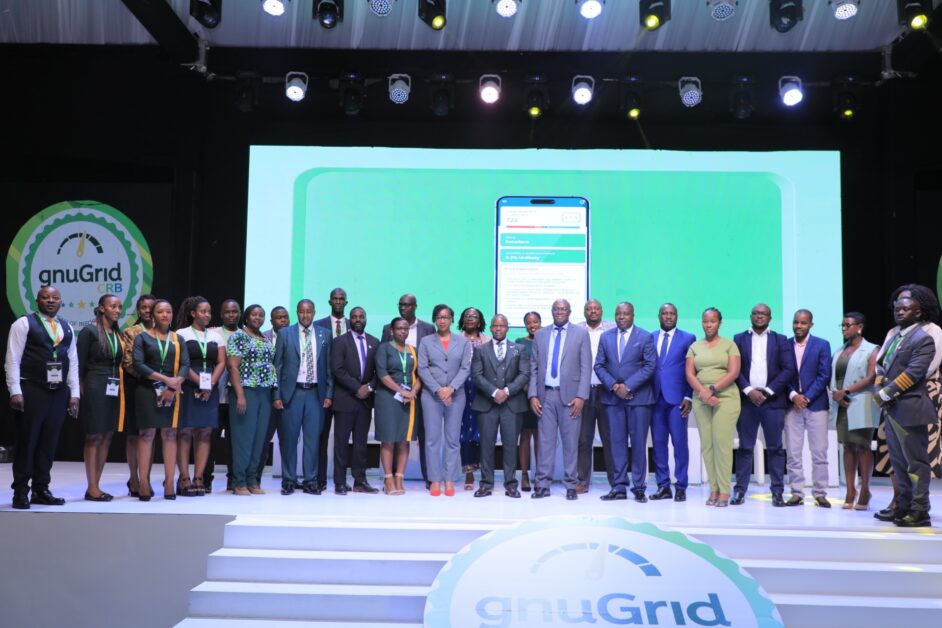Public and private sector stakeholders as well as development partners, in Uganda’s financial services ecosystem, have welcomed GnuGrid CRB and Airtel Mobile Commerce’s Mobile Credit Score as a significant milestone in the journey towards unlocking the transformative power of digital financial services in extending especially credit to the largely unbanked potential borrowers at the bottom of the pyramid.
Speaking at the launch of the mobile credit scoring system on 24th January 2024 at Kampala Serena Hotel, Moses Ogwapus, the Commissioner of Financial Services at the Ministry Of Finance, Planning And Economic Development and the guest of honour at the launch, said that the Mobile Credit Score was a “ground-breaking development that aligns seamlessly with the broader national core principles of financial inclusion, responsible lending, and the use of technology for economic empowerment”.
“The focus on financial inclusion, especially reaching the last mile customers, youth, and women, is a key pillar of our national economic development strategy. Microfinance institutions, particularly Tier IV, are crucial in delivering financial services to these underserved populations. The mobile credit scoring system unveiled today has the potential to revolutionise the way these institutions operate, making them more effective in reaching the grassroots and contributing to poverty alleviation”.
Pascal Mukisa, the Head of CRB Services, in the Department of Non-Banking Financial Institutions at the Bank of Uganda, said the use of alternative data in credit scoring, “creates a 360-degree understanding of who a prospective borrower and what is his or her ability to repay”.
“As a regulator overseeing the sector, we recognise the importance of these advancements and the contribution they make to the stability, efficiency and inclusivity of our financial system. Let us celebrate this milestone and recognise the potential of alternative data and alternative credit scoring in transforming our financial lives and driving economic progress,” he said.
He hailed gnuGrid for standing out as the only indigenous CRB.
“Initially, we thought, that credit information sharing was only a space for international companies from developed countries. But I’m glad and excited to present a local initiative that started from scratch and surprisingly, within a very short period, is now driving the innovation that we’ve all been waiting for,” he added.

Wilbrod Owor, Executive Director of Uganda Bankers’ Association (UBA), said that the partnership between GnuGrid CRB and Airtel Mobile Commerce Uganda Limited will unlock and unleash the huge untapped potential at the bottom of the pyramid.
“For a long time, we used to have a perception, and perhaps we still do, that borrowers down there are very risky and the majority are in agriculture. If we maintain this perception without a solution, it means that our country will remain underdeveloped forever because that’s where the biggest portion of our population is,” Mr. Owor said.
“There is a huge potential, an opportunity to unlock potential at the bottom of the pyramid that credit scoring, using alternative data, is bringing out. The power of partnerships and collaboration brings out the power of synergies, technology and data that can be harnessed to scale up access to credit,” Owor added.
Edith Tusuubira, the Executive Director of Uganda Microfinance Regulatory Authority (UMRA) applauded the credit score as a good step forward in unlocking financial access, especially for the youth who are the biggest consumers of digital financial services.
“Our mean age is 15.7 years. Most Ugandans are below 30 years; 77% of Ugandans are 25 years and below. They have moved away from paper transactions. Digitising access to financial services, especially bringing it to their mobile phones, is one step ahead in many right directions. I would like to thank and commend this partnership between gnuGrid CRB and Airtel Mobile Commerce Uganda Limited,” she said.
“The World Bank has already recognised credit rating and scoring as a crucial part of expanding access to finance. This is just one of the right steps in a good direction,” she added.
Giles Aijukwe, the Chief Executive Officer at Letshego Uganda, said that the Mobile Credit Score will help the financial services industry address the problem of lender-customer information asymmetry.
“We in the financial services space, especially the lenders are in the business of risk. In the past, the lender and the borrower treated each other with suspicion, yet we are supposed to be in a very symbiotic relationship. We give you a hand as a borrower, and you then have a responsibility to pay back,” he said.

“The first thing that this mobile credit scoring has done for us the lenders, especially those of us lending to the bottom of the pyramid is to solve the challenge of information asymmetry. That’s the biggest risk we deal with. Lenders are not sure that the information they are getting from borrowers is sufficient enough to make a decision. With this Mobile Credit Scoring, there are many data sets that this application can bring together and do a triangulation and assign a weight/rating based on your transaction behaviour with your telecom provider. Because we already have about 40% of information from other KYC channels and the traditional credit reference bureau information, this gives us a very reasonable amount of information on how to deal with the customer. It covers the gap of information asymmetry,” added Mr. Aijukwe.
Quoting the World Bank figures, Patrick Oketa, the Executive Director of Financial Sector Deepening Uganda (FSDU), said that previous methods of credit scoring only favoured the 9.1% of the population that have had access to credit before leaving out the other 90% that haven’t.
“The 90% who are unborrowed is a massive market. GnuGrid and Airtel Mobile Commerce Uganda Limited are demonstrating that alternative credit scoring is the way to go. Because this is the only way that we’re going to be able to bring the 90% that aren’t included, for access to formal credit,” said Mr. Oketa.

He added that FSDU is closely working with the MasterCard Foundation, “to enable as many of the grassroots players through Micro, Small and Medium Enterprises (MSMEs) to be able to access credit at market rates.
“Our role is to enable as many enterprises that will bring work to youth, and women down at the grassroots to be able to have access to credit, grow their businesses, and grow this economy,” he added.
On his part, Arnold Byarugaba, the Country MSME Lead at Mastercard Foundation said that the Mobile Credit Score would complement the Mastercard Foundation’s work of enabling financial access to the last mile of the population, especially the women and the youth, who do not have access to physical collateral.
“The traditional banking models and how credit is essentially assessed is largely dependent on collateral, financial records etc. Yet, if you think about the typical person, at the last mile, they are very comfortable saving money on their phone. They are also very comfortable saving their money within SACCO or Village Savings and Loan Associations. A large population, up to 90%, are accessing credit through that mechanism. Alternative data is demystifying that because it is telling us that there are many ways you can assess someone especially one who hasn’t accessed formal financial services before such as borrowing,” he said.
